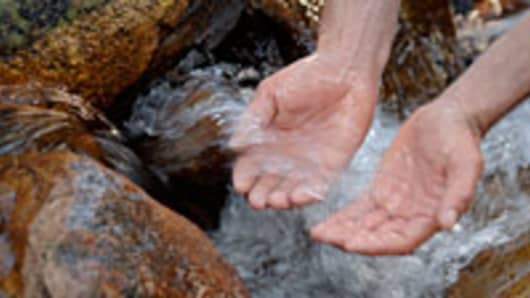Maine’s economy has always been reliant on its wealth of natural resources, and one in particular: water, first as a hub for shipbuilding and dam-powered factories, and now as a site for renewable energy.
“It’s a Disneyland of natural resources. There’s something for everyone here in our state,” Governor John Baldacci told CNBC’s “Worldwide Exchange.”
Maine ranked as the sixth best place to live in terms of quality of life on CNBC’s Top States for Business 2010 list—but placed 39th in its overall business friendliness. In response to the wide gap between Maine as a desirable place to live versus a sound choice to locate business, Baldacci said that, “We’ve made a lot of progress, but we need to do even more work in connecting the dots.”
His administration’s efforts to streamline business practices include shortening the turn-around time on permits from the state’s powerful Department of Environmental Protection (DEP), to 60 days from 90 days. The DEP and its tight permit requirements have historically been an impetus to businesses looking to relocate to the state, as well as for existing companies to expand.
“We like to be protective, but at the same time we want economic development, we want jobs, and we want the economy to pick up,” said Baldacci. “So we’re connecting the dots so developers and business people don’t have a long winding road filled with lawyers and consultants, more contractors and engineers.”
Baldacci mentioned Poland Spring as a company that has worked with the state to expand. The bottled water company pumps water from fresh springs throughout Maine which is then distributed to families up and down the east coast and worldwide.
“The quality of the water is very pristine, and the quality of the air, and especially the people we have here,” said Baldacci of the state’s three leading assets: water, clean air, and a dedicated work force.
The Baldacci administration also developed the Pine Tree Zone Program to boost economic development throughout of the state. The program creates tax incentives for companies that relocate to Maine or expand within its borders. The program has created more than 300 companies and 8,000 employees that are Pine Tree Zone certified, amounting to about $300 million in annual payroll.
“We basically said you give us good-paying jobs and benefits for our people and you keep the tax revenues that would have gone to the state,” said Baldacci of promoting the Pine Tree Zone program to interested companies. He added that a similar model could, and should, be undertaken at the national level to lure companies who have moved overseas back to the United States.
Maine is currently running a balanced budget with $50-70 million in reserves. From the beginning days of his governorship eight years ago, Baldacci refused to raise taxes, opting instead for close budget cuts and administrative consolidation.
Baldacci struggled to move Maine from its position as one of the states with the highest taxes in the country down to 15th or 16th. “It hasn't been easy,” he said. “I've made a lot of tough decisions. I've irritated an awful lot of people.”
In response to the criticism that he caved to consumers by refusing to raise taxes, Baldacci said, “There's a lot of innovation out there and a lot of ingenuity. We're just practicing our ability to think outside the box. Isn't it more challenging to figure it out without raising taxes than with raising taxes?"
Baldacci relied on his previous experience with running a small, third-generation family restaurant to make aggressive cuts, including the $10 million in additional cuts that he announced earlier this month.
“In the restaurant business, my dad always used to say when you left the kitchen, don't come back empty handed,” he said. “In Maine, when you talk to farmers, you talk to fisherman, they are innovative and they are getting by and they are creative in stretching dollars. They pride themselves on that.”
Two of Baldacci’s largest—and most controversial—cost-saving initiatives have been consolidating many of the state’s schools and correctional facilities, often against the wishes of county commissioners and local officials.
Baldacci even came up against his brother, Peter Baldacci, a Penobscot county commissioner, when he consolidated facilities there. “We don’t have printing presses. We’ve got to pay for these things. We’ve got to balance our budget. And the only way is to make these tough hard decisions,” he said.
Asked if consolidation is merely a euphemism for cutting jobs and laying people off, Baldacci said, “Yes, they are cuts and layoffs, but what you are doing is to bring in 300 or 400 jobs or 800 jobs.” He added that most of these jobs are created in the private sector.
School consolidation has been a particularly salient issue in a state that has the highest median age in the entire country. Maine’s elderly population is predicted to double by 2030, a tax problem that is exacerbated by the exodus of young Mainers from the state.
The state relies heavily on its older population, those who live in Maine year-round and also the thousands of retirees who flock to Maine annually. Baldacci said that the lost tax revenues from this population are not felt as acutely since they also require fewer services. His administration has been pumping money into transportation, parks, and recreational facilities, “to actively work on recruiting and maintaining an older population,” he said.
For Maine’s retirees as well as its economy, it all comes back to water. Along with marketing itself as a seaside destination, Maine has positioned itself as a renewable energy hub with ample wind, water and solar resources. Baldacci hopes that this will create a new wave of outside investment that will create jobs and spawn innovation opportunities for Maine companies.
“They don’t want handouts in Maine. They want to earn their living. They want to support their families. They want to be independent,” he said of Mainers. “Being governor of this state is like being the moderator at a town meeting. We open it and close it but it’s the people that run it in between.”
Empowering the people to fix their fiscal problems is a lesson that Washington could learn as well, said Baldacci. He suggested that federal officials would benefit from shadowing a Maine lobsterman for the day, to “see how they stretch dollars, see how they are efficient, see how they are caring about our environment and resources.”
“These fishermen can tell you what Washington is doing,” he added. “Establishing priorities, getting back to what’s essential and getting back to talking to one another — not just throwing mud balls at each other.”
Look for Nicole Lapin's interview with Maine Governor John Baldacci in her "States of Pain" report Wednesday, October 27 on "Worldwide Exchange,"5-6am ET on CNBC.





